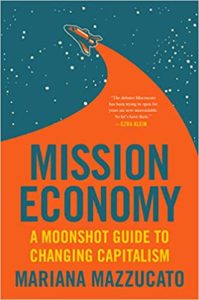In the City Journal, I have a review of Mariana Mazzucato’s new book – alas, not as brilliant as John Kay’s one. I am afraid my opinion of this new work is not necessarily better than the one I had of her previous ones. In this new book, Mazzucato uses the moonshot as an example of what “mission oriented directionality” can produce, when applied to the whole of the economy.

There is not much new in Mazzucato’s new book compared to her previous ones. What always astonishes me about her (and similarly, other industrial policy advocate types’) views is how highly complex processes are sketched into very simple drawings. The processes by which things are produced and marketed are seen as the reflection of easily identifiable and relatively simple decisions by those on top.
There is a little bit of that in the contemporary discussion over Covid-19 vaccines (at least in Europe). People talk about the making and producing of such vaccines as something which should be “expected”, somehow from Big Pharma, like Santa delivers presents on Christmas. That policy decisions other than pouring money at it can affect the production process is uncontemplated. It is easy to talk of “missions” and “directionality” but it is often quite controversial which mission should be undertaken – and with what kind of resources. Plus, an economy is not about one single need, picked by foresighted decision makers, in periods other than war time. The needs of people are many; not all of them can be met in the same way, let alone at the behest of some legislator who knows which ones should be privileged at the expense of others.
I think a commentator had it right: “The moonshot approach, a concentrated effort to accomplish one large, specific, scientific/engineering project, with no real concern for cost, cannot be applied to an entire national economy.”


READER COMMENTS
Christophe Biocca
Apr 7 2021 at 5:39pm
If you’ve lived all your life in a mostly-market economy you can get away with treating how products become available for purchase as a black box (money and request go in, the desired good comes out).
And if you look at the moonshot projects in market economies from far enough away, that still mostly holds (von Braun designed the Saturn V, but construction of each stage/system was handed to outside contractors, who had some leeway on implementation).
But all this relies on effective price signals and flexibility in the private sector. A lot of public spending comes with ever-greater micromanagement of the implementers’ work, whether through in-housing or through rules applying to whoever wins the contract. The worse this gets the more likely the end result is that you get nothing to show for the amount you’ve spent.
Grand Rapids Mike
Apr 15 2021 at 12:45pm
To extend the discussion, the book “Frackers” not sure of the exact title, provides and interesting example of how a bunch of grubby oilmen worked to create the fracking process. It was not a moon shot by goverment experts. In another vain back in the late 1970’s Department of Energy set out to create a battery technology for cars, with little success. Essentially the new battery technology was created by the private sector. LBJ’s war on poverty created single parent families, begetting the disaster of the Black American family structure.
The main problem is that so many really intelligent people in think tank of all types just know they can solve all the problems in the world. They need to read more of Hayek thoughts, before telling the world what to do.
Comments are closed.